This captivating collection of 115 science trivia questions and answers tests your knowledge. Challenge yourself and your friends to see who can answer the most questions correctly. Explore the wonders of science and expand your understanding of the natural world. Get ready for an exciting and educational trivia experience that will leave you craving more knowledge.
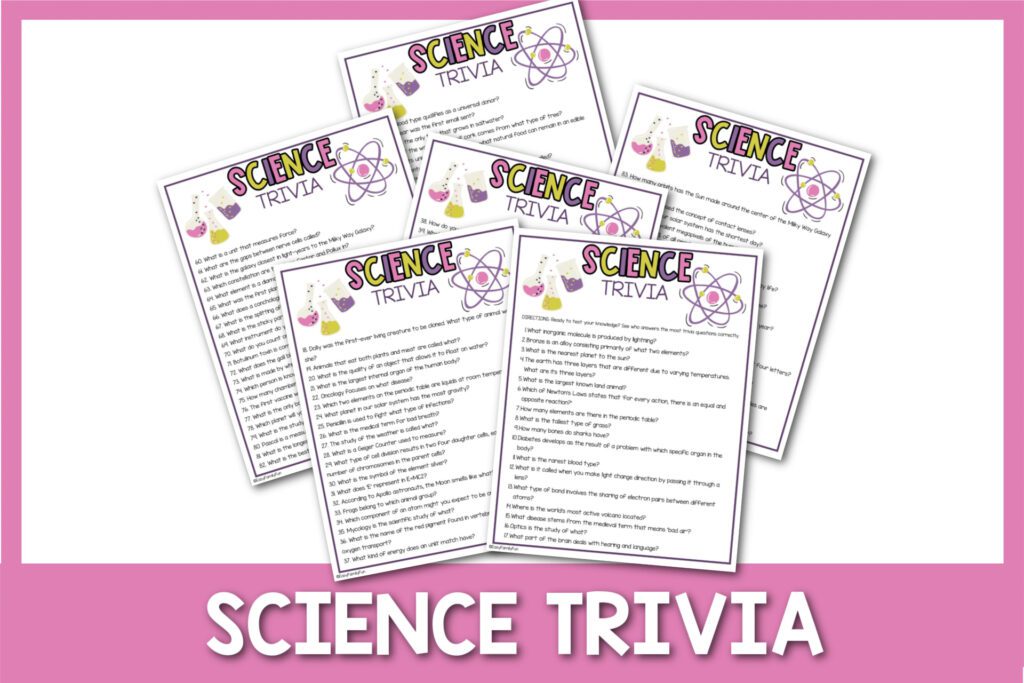
Science Trivia
Prepare for an electrifying adventure into the world of science trivia!
In my home, we have a reigning trivia king—my husband! It’s always a fun adventure to find a trivia game that can outsmart his encyclopedic knowledge. We gather ’round, sharing laughter and excitement, secretly hoping to outshine his brilliance. We’ve explored an incredible array of trivia games, from Dog Trivia to Outdoor Trivia, even delving into the depths of dinosaur Trivia, all in pursuit of finding a topic he knows nothing about!
These science trivia questions have been so fun to play as a family. They have brought friendly competition to the dining room table and on our past road trip. We know your family will love these science trivia questions as much as mine.
Ready to discover some of the most fascinating facts as you play? Get ready to ignite your curiosity and let the science trivia battles begin!
Why I Love Trivia Games
There are so many reasons to love trivia games. It is an enjoyable way to expand your knowledge on topics that you and your kids love.
Trivia games can go anywhere with you and are ready in an instant. Whether you have trivia nights at home or play while driving in the car, you are guaranteed to have a great time.
One of our favorite things about trivia games is that anyone can participate. I love when someone discovers they are smarter than they thought on a certain subject.
When playing in teams, trivia games create strong bonds with siblings as they work together to answer the questions creating unforgettable memories as a family.
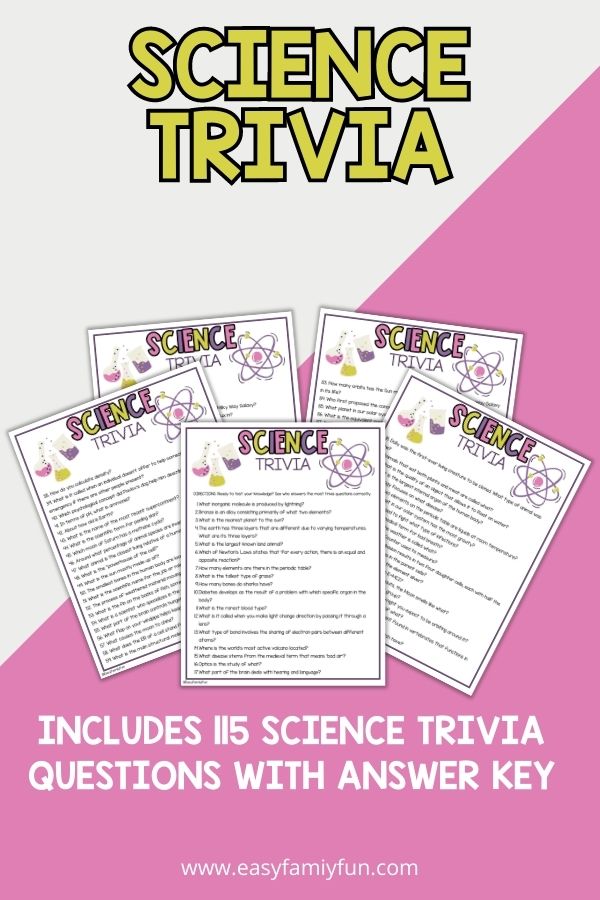
How to Play Science Trivia
Playing Trivia: A Guide
- Select your desired question category, such as science trivia or dinosaur trivia.
- Consider forming teams, ensuring a fair distribution of members. Avoid grouping all adults or all young children together.
- If playing individually, take turns being the question reader. In team play, pass the question-asking duty back and forth between teams, ensuring the team answering isn’t the one asking the questions.
- Enjoy the excitement of reading and answering the questions. Keep track of each team’s points throughout the game.
- Once all the questions have been answered, determine the winner based on the team or individual with the highest score.
- Have a blast and immerse yourself in the world of trivia!

Benefits of Trivia
Trivia games are more than just entertainment for kids and adults. There are so many benefits that go along with playing trivia games.
- They provide a platform for expanding our knowledge in areas that interest us.
- They cater to individuals of all ages, enabling the entire family to participate and engage.
- Through the ups and downs of competition, players learn valuable lessons about winning and losing, fostering good sportsmanship.
- The joy of playing games together strengthens family bonds, creating lasting memories and deeper connections.

Tips and Tricks for Playing Trivia
These tips and tricks can enhance your trivia game experience.
- Designate a question asker while each team appoints a representative to answer questions and compete against their opponents by buzzing in.
- Offer prizes for those who answer questions correctly. Consider small toys or delicious treats like candy as rewards.
- Utilize trivia questions to make waiting for food at a restaurant more enjoyable. It adds an entertaining element to pass the time while eagerly anticipating your meal.
- Introduce a time limit for answering questions. If a participant fails to respond within the specified time frame, allow others to seize the opportunity and steal the point. This adds an exciting twist to the game and keeps everyone on their toes.
Best Science Trivia Questions and Answers
Grab your science trivia questions right here to get started.

What inorganic molecule is produced by lightning?
Ozone
Bronze is an alloy consisting primarily of what two elements?
Copper and Tin
What is the nearest planet to the sun?
Mercury
The earth has three layers that are different due to varying temperatures. What are its three layers?
Crust, mantle, and core
What is the largest known land animal?
Elephant

Which of Newton’s Laws states that ‘for every action, there is an equal and opposite reaction?’
The third law of motion
How many elements are there in the periodic table?
118
Love Trivia Questions? Grab this ultimate trivia bundle!
- What is the tallest type of grass? Bamboo
- How many bones do sharks have? Zero
- Diabetes develops as the result of a problem with which specific organ in the body? Pancreas
- What is the rarest blood type? AB
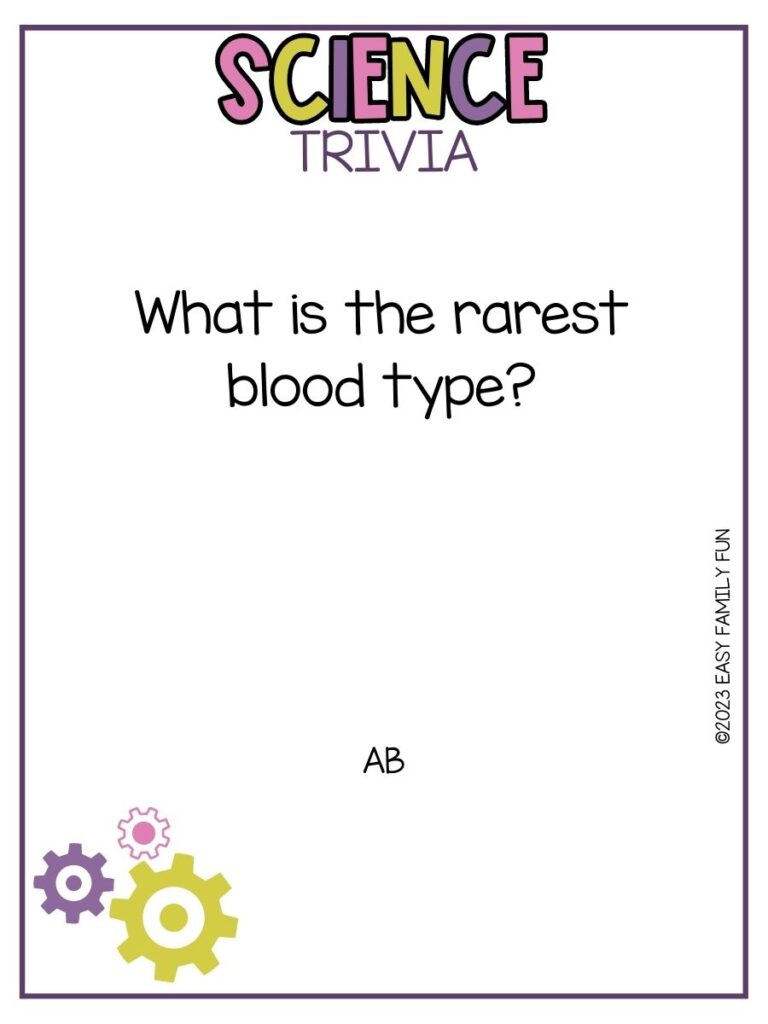
- What is it called when you make light change direction by passing it through a lens? Refraction
- What type of bond involves the sharing of electron pairs between different atoms? Covalent
- Where is the world’s most active volcano located? Hawaii
- What disease stems from the medieval term that means ‘bad air’? Malaria
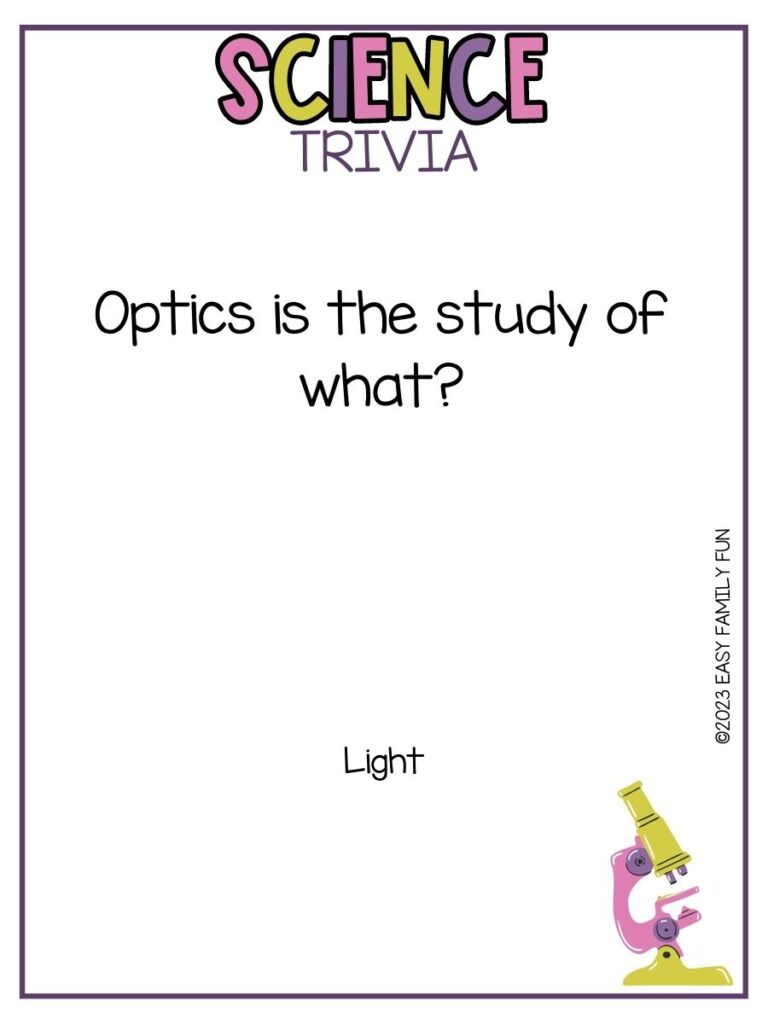
- Optics is the study of what? Light
- What part of the brain deals with hearing and language? Temporal lobe
- Dolly was the first-ever living creature to be cloned. What type of animal was she? Sheep
- Animals that eat both plants and meat are called what? Omnivores
- What is the quality of an object that allows it to float on water? Buoyancy
- What is the largest internal organ of the human body? Liver
- Oncology focuses on what disease? Cancer
- Which two elements on the periodic table are liquids at room temperature? Mercury and Bromine
- What planet in our solar system has the most gravity? Jupiter
- Penicillin is used to fight what type of infections? Bacterial
- What is the medical term for bad breath? Halitosis

- The study of the weather is called what? Meteorology
- What is a Geiger Counter used to measure? Radiation
- What type of cell division results in two four daughter cells, each with half the number of chromosomes in the parent cells? Meiosis
- What is the symbol of the element silver? Ag
- What does ‘E’ represent in E=MC2? Energy
- According to Apollo astronauts, the Moon smells like what? Burnt gunpowder
- Frogs belong to which animal group? Amphibians
- Which component of an atom might you expect to be orbiting around it? Electrons
- Mycology is the scientific study of what? Fungi
- What is the name of the red pigment found in vertebrates that functions in oxygen transport? Hemoglobin

- What kind of energy does an unlit match have? Chemical energy
- How do you calculate density? Density is mass divided by volume
- What is it called when an individual doesn’t offer to help someone in an emergency if there are other people present? Bystander effect
- Which psychological concept did Pavlov’s dog help him describe? Conditioning
- In terms of pH, what is ammonia? Basic
- About how old is Earth? 4.5 billion years
- What is the name of the most recent supercontinent? Pangea
- What is the scientific term for peeling skin? Desquamation
- Which moon of Saturn has a methane cycle? Titan
- Around what percentage of animal species are invertebrates? 95%

- What animal is the closest living relative of a human? Chimpanzee
- What is the “powerhouse of the cell?” Mitochondria
- What is the sun mostly made up of? Hydrogen
- The smallest bones in the human body are located where? The Ear
- What is the scientific name for the job or role an organism plays in its habitat? Niche
- The process of weathered material moving due to gravity is called what? Erosion
- What is the fin on the backs of fish, some whales, and dolphins called? Dorsal Fin
- What is a scientist who specializes in the study of cells called? Cytologist
- What part of the brain controls hunger? Hypothalamus
- What flap on your windpipe helps keep out food particles? Epiglottis

- What causes the moon to shine? Reflection from the sunlight
- What does the ER of a cell stand for?Endoplasmic Reticulum
- What is the main structural molecule in hair and nails? Keratin
- What is a unit that measures force? Newtons
- What are the gaps between nerve cells called? Synapses
- What is the galaxy closest in light-years to the Milky Way Galaxy? Andromeda
- Which constellation are the stars Castor and Pollux in? Gemini
- What element is a diamond composed of? Carbon
- What was the first planet discovered with the aid of a telescope? Uranus
- What does a conchologist collect? Seashells

- What is the splitting of atomic nuclei called? Nuclear Fission
- What is the sticky part of the pistil called? Stigma
- What instrument do you use to measure wind speed? Anemometer
- What do you count on a tree to tell how old it is? Its rings
- Botulinum toxin is commonly referred to as what? Botox
- What does the gallbladder secrete? Bile
- What is made by white blood cells to help fight off infection? Antibodies
- Which person is known for publishing “The Interpretation of Dreams”? Sigmund Freud
- How many chambers make up the human heart? Four
- The first vaccine was for which disease? Smallpox

- What is the only bone in the human body that isn’t attached to any other bone? Hyoid bone – located in the throat.
- Which planet will you find between Jupiter and Uranus? Saturn. It is the sixth planet in our solar system.
- What is the study of fungi called? Mycology
- Pascal is a measure of what? Pressure
- What is the longest muscle in the human body? Sartorious – from the pelvis to just below the inside of the knee.
- What is the best-selling personal computer model of all time? Commodore 64 – 17 million units with a 1 MHz processor and 64KB RAM
- How many orbits has the Sun made around the center of the Milky Way Galaxy in its life? 20
- Who first proposed the concept of contact lenses? Leonardo da Vinci
- What planet in our solar system has the shortest day? Jupiter – 10 hours
- What is the equivalent megapixels of the human eye? 576 megapixels
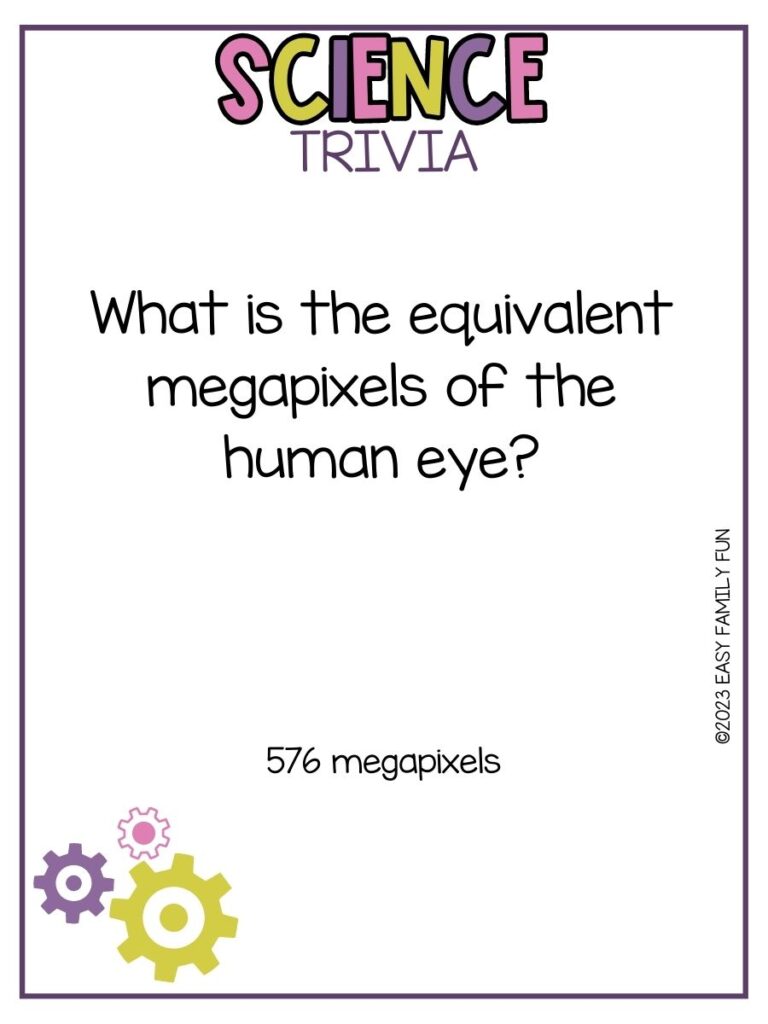
- Approximately 2% of all people have what eye color? Green – Brown is 55%; hazel and blue are 8% each.
- How many constellations are in the night sky? 88
- What are the four states of matter observable in everyday life? Solid, liquid, gas, plasma
- Marble is formed by the metamorphosis of what rock? Limestone
- In its natural form, aspirin comes from the bark of what tree? White willow tree
- What metal has the highest melting point? Tungsten – 6,192 degrees Fahrenheit
- How many times does the Moon revolve around the Earth in a year? 13
- What is the smallest organ in the human body? Pineal gland – in the center of the brain
- What is the largest 3-digit prime number? 997
- What planet in our solar system has the longest day? Venus – 243 Earth days
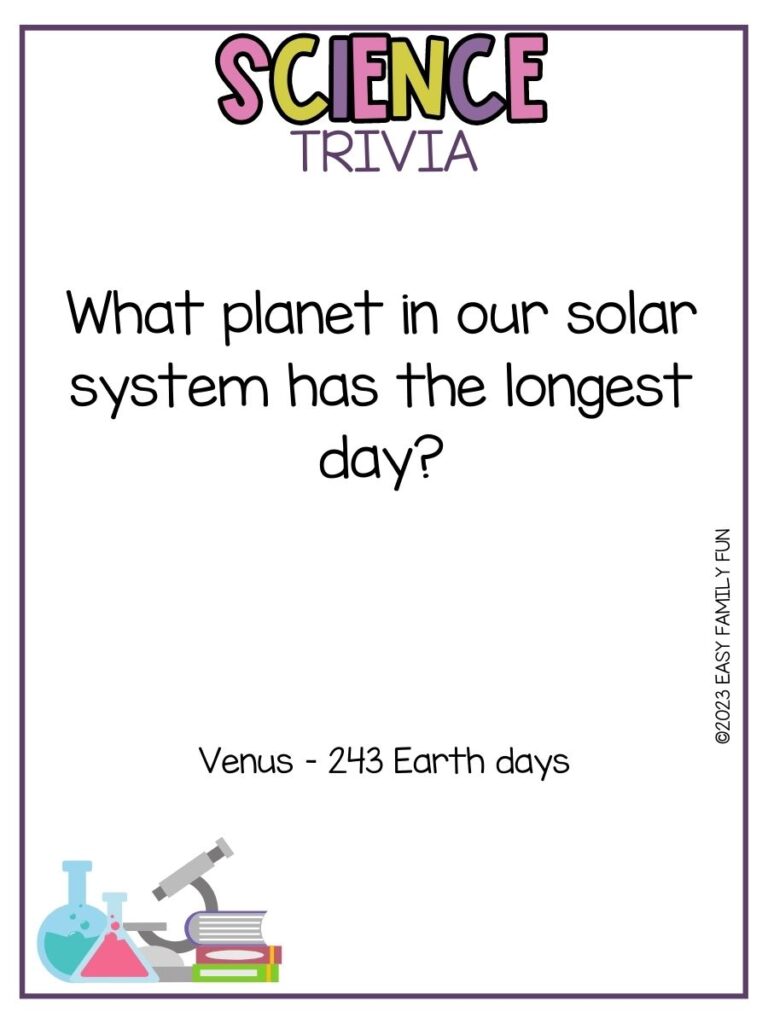
- The European organization for nuclear research is known by what four letters? CERN – from the French “Conseil Europeen pour la Recherche Nucleaire”
- What are metals not considered precious called? Base metals
- What is the only planet in our solar system less dense than water? Saturn
- An astronomical unit is defined by what distance? Earth to the Sun – 93 million miles
- Located near the root of human hair follicles, the arrector pili muscles are responsible for what phenomenon? Goosebumps
- What figure has four sides all the same length but no right angles? Rhombus
- What was the name of the first electronic general-purpose computer? ENIAC – 1946
- What blood type qualifies as a universal donor? O negative
- What year was the first email sent? 1971
- What is the only tree that grows in saltwater? Mangrove
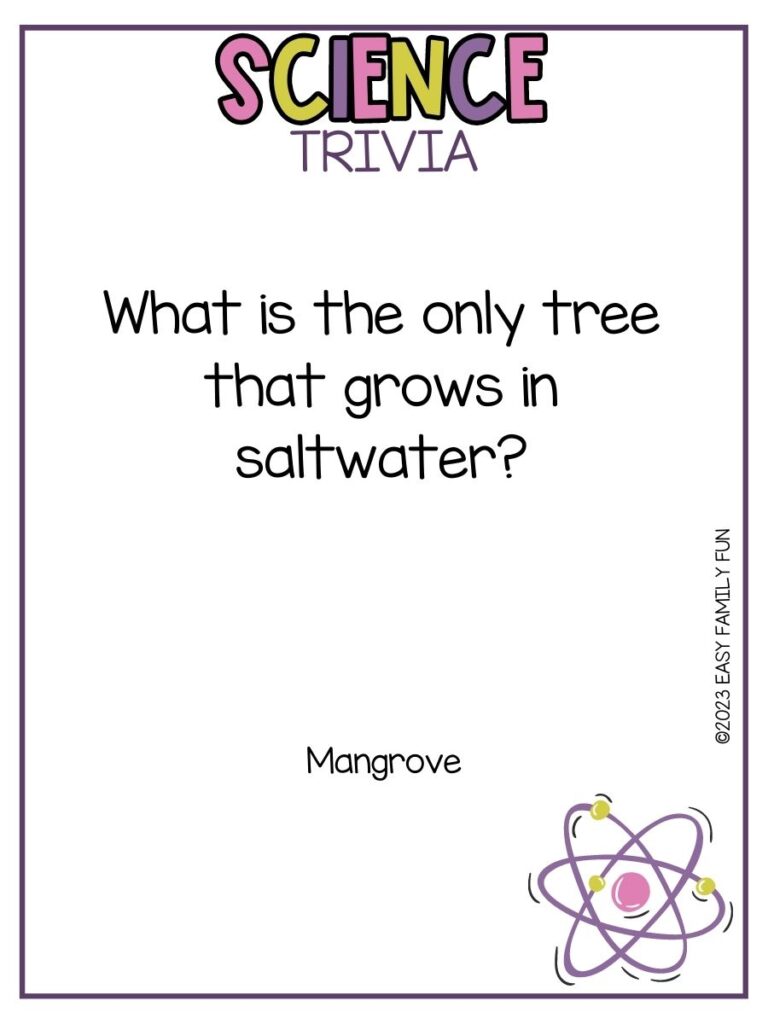
- Most of the world’s supply of cork comes from what type of tree? Oak – cork oak trees predominantly in Portugal and Spain
- Due to its unique chemical qualities, what natural food can remain in an edible form for centuries? Honey – 3,000-year-old edible honey has been found in tombs.
- What is the smallest named time interval? Planck time – 5.39 x 10–43 seconds
- What is the effect of the Earth’s rotation on the wind called? Coriolis
- What is the most abundant metal in the Earth’s crust? Aluminum
- What name is given to a chemical reaction that takes in heat? Endothermic
- Who formulated the laws which first explained the movements of the planets properly? Johannes Kepler
- What is a material that will not carry an electrical charge called? An insulator.
- What color is at the top of a rainbow? Red – Violet is at the bottom.

Did any of these science trivia questions stump you? Share your favorite in the comments.
Are you a fan of trivia? Check out our other awesome trivia questions now!
- Bible Trivia
- Easter Bible Trivia
- Chick Flick Trivia
- Winter Sports Trivia
- Outdoor Trivia
- Spring Break Trivia
- Halloween Trivia
- Thanksgiving Trivia
- Baseball Trivia
- Christmas Trivia
- Dog Trivia
- Sports Trivia
- Teen Trivia
- Trivia for Kids
- Football Trivia
- Best Trivia Questions for Kids and Adults
- Music Trivia
- History Trivia
- Valentine’s Day Trivia
- Geography Trivia Questions
- Dinosaur Trivia
- Golf Trivia
- Science Trivia
- Shark Trivia Questions and Answers
- Ocean Trivia Question and Answers
- Amazing Art Trivia
- Super Sweet Candy Trivia
- Beautiful Spring Trivia
- Horse Trivia Questions and Answers
If you’re ready to show off your trivia skills, make sure to subscribe to our email list! That way, you’ll be the first to know when we’ve added new topics for even more brain-teasing fun.
How Do I Print A PDF?
You’ll need a program that supports PDFs. Adobe Acrobat is a great option. Open the program, click file, then print. Select your printer and the number of copies you want to print. Be sure you click double-sided if you want it to print on both sides.
Can I Resell These?
You may not resell any printable that you find on our website or in our resource library. You may use them for class parties, at church, at home, or in the classroom. You may get these printed at an office supply store or copy center at your own expense.
